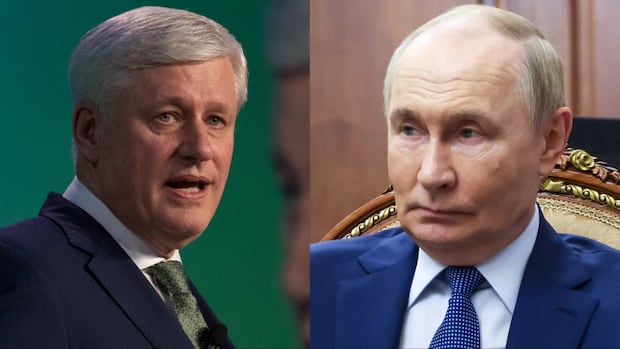Former prime minister Stephen Harper says Russian President Vladimir Putin is “a real-life Bond villain” and “an evil man” who will leave Russia poor and in chaos.
“It’s a tragedy that somebody with his ability just wasn’t imbued with any sense of ideals or higher purpose,” Harper said on Monday during a keynote session at the Council of State Governments Midwestern Legislative Conference in Saskatoon.
Harper’s comments were in response to a question from the moderator about which global leader, whether ally or rival, left the strongest impression on him.
“I try in my memoirs to say good things about people or not say much at all,” Harper said before he launched into a sharp critique of the Russian president.
The former prime minister acknowledged that Putin is smart, hard-working and “a real psychological expert,” but that he is also “an evil man. He took what is a fledging democracy and turned it back into a tyranny.”
Former prime minister Stephen Harper, speaking Monday at a conference in Saskatchewan, said that Russian President Vladimir Putin is a ‘psychological expert’ with the ability to size up and exploit people’s weaknesses — but stressed that he thinks Putin is an ‘evil man’ who will leave Russia in ‘chaos.’
“I don’t accept a drink from him or anything like that,” Harper joked — a likely reference to allegations the Russian government has poisoned dissidents like Alexei Navalny, who died last year in a remote Russian prison.
Harper’s frustrations with the Russian president go back more than a decade. In 2014, Harper was lauded by Australian media for admonishing Putin over Russia occupying and annexing Crimea.
Australian media reported Harper told Putin to “get out of Ukraine” at a private leaders’ retreat ahead of the official opening of the Group of 20 summit in Brisbane.
Harper told the Saskatoon conference that he and Putin “had a notoriously bad relationship by the end — quite deliberate on my part, actually …”
“Privately I was calling him out on this stuff all the time and quite getting under his skin actually, which I enjoyed,” Harper said.
U.S. actions ‘we can’t forget’
During his keynote, Harper said Americans should understand that Canadians “are a combination of just angry and bewildered by what is happening here. That is very real and it is very deep.”
He added that U.S. President Donald Trump’s administration believes “everybody needs America, but America doesn’t need anybody. That just isn’t true.”
“The Trump administration is completely right to deal with some of its trade challenges. But declaring a trade war on 200 other countries at the same time? Come on. That’s not how you move the ball forward long term.”
Canada is working to reach a trade agreement with Trump by Aug. 1. The U.S. president has threatened to slap a 35 per cent tariff on goods that don’t comply with the Canada-U.S.-Mexico Agreement (CUSMA) on that date.
Although U.S. President Donald Trump’s Aug. 1 deadline is fast approaching, there is no sign of a breakthrough yet on a new Canada-U.S. trade deal after a week of talks in Washington, D.C. Ottawa continues to say it won’t sign anything that isn’t in Canada’s best interest.
Harper said Canada seeing the United States “flex its muscles in a way that has nothing to do with values or ideals, that is something we can’t forget. We cannot make ourselves entirely dependent on that relationship.”
He agreed with Canada’s decision to spend more on defence and said “we should have been doing it all along.”
Between 2012 and 2015, the Conservatives — led by Harper — faced substantial criticism for cutting the Department of National Defence budget by $2.7 billion annually in order to reach a balanced budget.
Carney has committed to meeting the NATO benchmark of spending two per cent of the country’s gross domestic product on defence by the end of current fiscal year in March.
As part of a new pact with NATO leaders, Canada has also promised to spend five per cent of GDP on defence-related projects by 2035.


